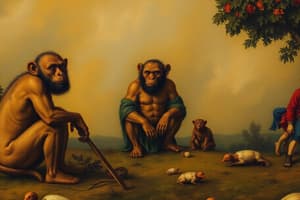Podcast
Questions and Answers
Which term refers to early relatives of modern-day humans?
Which term refers to early relatives of modern-day humans?
- Hominid (correct)
- Hunter-Gatherers
- Homo sapiens
- Nomads
What is the significance of Homo erectus in human evolution?
What is the significance of Homo erectus in human evolution?
- First to create stone tools
- First to walk on two feet full time and control fire (correct)
- Closest extinct hominid to humans
- Believed to bury their dead
Which era is associated with the shift from hunting and gathering to agriculture?
Which era is associated with the shift from hunting and gathering to agriculture?
- Stone Ages
- Ice Ages
- Neolithic Era (correct)
- Paleolithic Era
What does the term anthropologist refer to?
What does the term anthropologist refer to?
Which of the following is NOT a characteristic of Neanderthals?
Which of the following is NOT a characteristic of Neanderthals?
What is the role of domestication in human society?
What is the role of domestication in human society?
Where is the Bering Strait located?
Where is the Bering Strait located?
Which is a defining feature of the Paleolithic Era?
Which is a defining feature of the Paleolithic Era?
Flashcards are hidden until you start studying
Study Notes
Prehistory
- The time period before written records
- The study of prehistory is known as archaeology
Anthropology
- The study of humans and their development, including human culture and behavior
Hominids
- Early relatives to modern-day humans
- Australopithecus, Homo habilis, Homo erectus, Homo sapiens, and Neanderthals are some examples of hominids
Australopithecus
- “Southern ape” and believed to be one of the first hominids capable of walking on two feet
- Lucy is an example
Homo habilis
- “Handy man” and believed to be one of the first hominids to create stone tools
Homo erectus
- “Upright man” and believed to be the first hominid to walk on two feet full time, learn to control fire, and migrate outside of Africa
Homo sapiens
- “Wise man” and the group including modern-day humans, which is believed to be the first hominid to develop language
Neanderthals
- The closest extinct hominid to humans who lived across Europe and central Asia, and is believed to be the first hominid to bury their dead
Otzi the Iceman
- A Homo sapien from (circa) 3,300 BCE who was discovered frozen in a glacier
- One of the oldest mummies in human history
Technology
- The application of science and engineering to create tools that improve the quality of life
Stone Ages
- Period of time where humans invented and primarily used stone tools
- Includes the Paleolithic era and the Neolithic era
Paleolithic Era
- Old Stone Age, which occurred circa 2.6 million years-10,000 years ago
- Humans were primarily hunter-gatherers
Neolithic Era
- New Stone Age, which occurred circa 10,000 years ago
- Shift from hunting and gathering to agriculture
- Domestication of animals and plants
Society
- A group of people living together within a community
Hunter-Gatherers
- People who hunt animals and gather wild plants for food
Nomads
- People without a permanent home, either individually or as a community, who move from place to place
Migration
- Movement from one location to another, in order to establish a new permanent settlement
Population
- The total number of people within a specific area, such as a city, state, or country
Ice Ages
- Time periods with consistently freezing temperatures throughout the world
- Often responsible for large-scale migrations, as ice formations blocked off landmasses and made it possible to travel across frozen waters
Glacier
- A large mass of ice that covers a section of land
Bering Strait
- A narrow passage of water located between Russia and Alaska
- It is believed that humans crossed a frozen land bridge from Asia to North America during the Ice Ages
Domestication
- Planting foods and breeding animals that are useful for humans
- A key development in the Neolithic Era
Studying That Suits You
Use AI to generate personalized quizzes and flashcards to suit your learning preferences.




